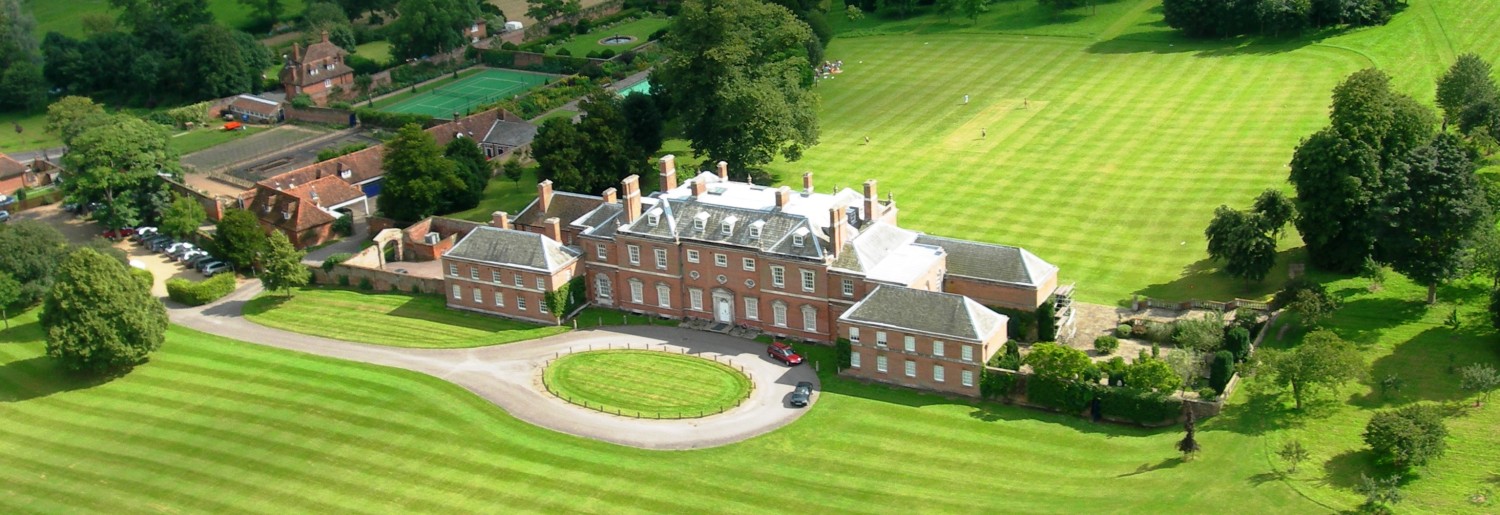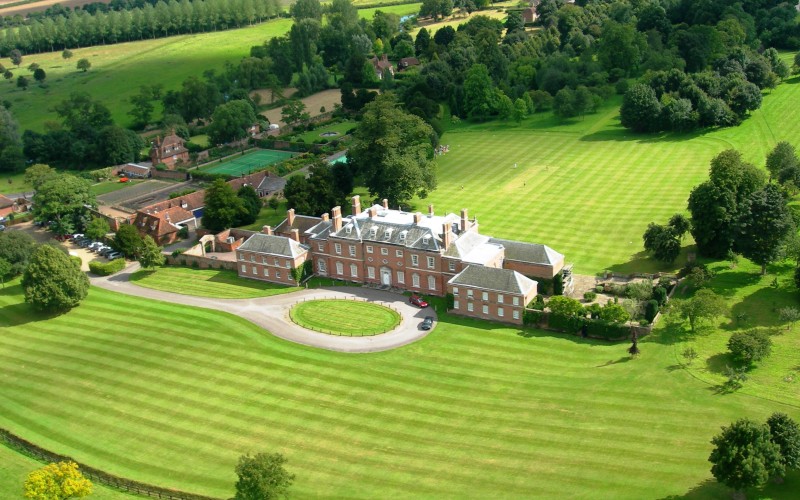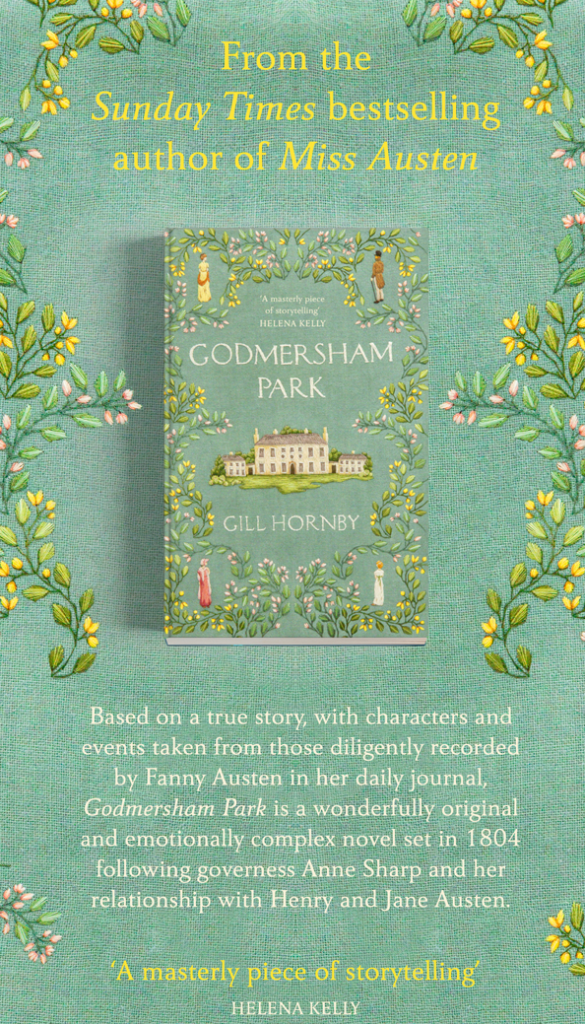Godmersham Park: A new novel by Gill Hornby
If you have studied at Godmersham, home of ABDO College, have you found the beautiful house and grounds an inspiring place to work? If so, you are in excellent company. In the early nineteenth century Jane Austen was a regular visitor to Godmersham, then home to her brother Edward and his family. Edward had inherited Godmersham Park from Thomas Knight, and his sisters visited regularly. These visits often lasted several months, during which Jane wrote letters describing shopping in Canterbury as well as the day-to-day life in the great house.
Jane drew on her experiences in Kent for her descriptions of her fictional grand houses, perhaps inspired by the view of deer feeding on the green slopes surrounding the house, by parties and quiet evenings after dinner, playing charades, reading, listening to music and talking with her family. Jane Austen’s novel Mansfield Park is said to depict characters and scenes from the village – and it has also been suggested that the house was the basis for Rosings, the home of Lady Catherine De Bourgh in Pride and Prejudice.
Now, novelist Gill Hornby has combined her love of Jane Austen’s work with the beauty of the mansion and estate in a novel entitled Godmersham Park. Set in 1804, Anne Sharpe arrives at Godmersham to take up the position of governess. At thirty-one years old, she has no previous experience of either teaching or fine country houses. But her mother has died and she desperately needs an independent income if she is to survive.
Author Gill Hornby’s debut novel, Miss Austen, focussed on Jane’s older sister Cassandra, and was set in Kintbury where Gill lives. Like many of us, she first encountered Jane Austen’s works at school. She says, “I was really bad at school, yet somehow I crept into sixth form to study English A level. There, I met the teacher who changed my life and saw the point of me. Mrs F was a Jane Austen fanatic. We were doing Mansfield Park for A level, and I read all the novels.”
Gill’s second prompt to delve deeper into the lives of the Austen family came when she moved to Kintbury. She says, “I was told that the house had a Jane Austen connection. Cassandra was engaged to the vicar’s son who had lived there. The engagement was broken off which really got me thinking about the was nineteenth century women’s lives could be thrown up into the air, it really was a game of wits for them.”
Gill was asked to write a biography of Jane Austen for a younger readership which enabled her to delve into biographies and memoirs. She says, “The Austens are a huge, interesting family, with extraordinary events occurring to them. They are like my EastEnders. The more I read, the more involved I became.”
Miss Austen became a bestseller and one of the best novels of the year according to the Times and Observer. It is also set to be televised. Gill says, “When Miss Austen did well my editor asked for more ideas. I knew that Godmersham Park is where Jane Austen learnt about country house life compared to the middle-class parsonage she grew up with.”
Gill started writing, and she says, “I only realised the similarities to Mansfield Park about 40 per cent through writing the book. I love a big house situation, like Downton Abbey. Anne Sharpe made me think of Fanny Price in Mansfield Park, with the family but not of the family, between upstairs and downstairs but not belonging in either. It would have been a precarious balancing act. I don’t know if Jane based Fanny Price on Anne, but the similarities are spooky, even to the extent that they both ran amateur theatricals.” She adds, “The upstairs/downstairs vibe isn’t touched on in Jane Austen’s books but the letters are full of them, how they lived cheek by jowl, servants knew everything you were up to. Some servants made their masters lives a misery, others became closest friends.”
Gill started writing the book in lockdown which gave her two dilemmas. She couldn’t visit Godmersham Park, nor could she access the diaries written by Fanny Austen, the daughter of the house who Anne was brought in to educate. She says, “I needed Fanny’s diaries from the Maidstone records office, and I wanted to walk endlessly around Godmersham. Photos don’t give the sense of how the house sits or breathes. I had a breakthrough, though. A wonderful woman who used to live in Godmersham said she had photocopied the diaries and sent them to me, so that got me through my first lockdown.”
With a first draft in hand, Gill was finally able to go to Godmersham. She says, “I could see the hall and downstairs. It was an extremely hot day. Margaret Smyth and Rebecca from the visitor’s centre showed me everything, the temple, the gothic seat, the church, the hole in the wall from the lime avenue to the church. I videoed it all and made notes.” She adds, “The crucial thing was to stand outside and see the house. It is big, impressive, but also friendly and unpretentious. It is domestic architecture. In the hall I could imagine Anne turning up for the first time, after dark on a January night.”
Anyone who has been to Godmersham will enjoy reading the novel not just for the story but also for the descriptions of the house and estate when it was a family home. Anne’s awkward role means she is neither one of the servants nor one of the family. She has to balance a position between the ‘upstairs’ and ‘downstairs’ members of the household which gives readers the chance to imagine both the attic bedrooms and the gracious rooms downstairs as they would have been in the 1800s.
Gill’s extensive research is clear throughout the book, and for those who are as gripped by the book as I was you will be keen to read the Author’s Note at the end which outlines what happened to the real Anne after she left Godmersham Park. After further positions as a governess and as a companion she was able to set up a boarding school in Liverpool. She lived as a respected member of the community and continued to correspond with Jane Austen until Jane died. Anne retired in comfort and died peacefully in 1855. She left a good estate including cash, shares and jewellery which was distributed among 43 ‘very dear’ friends, showing she had made a good life for herself, had loved and was loved. Gill says, “I found her will so moving, she had all these friends in her life. If you didn’t have a distinguished husband and a property, you relied on friendship. She must have changed lives and found communion with many people, as well as with Jane.”
Godmersham Park will be released 23 June. Gill Hornby will be attending bookshop events signings and festivals across the UK this summer. Books will also be available to purchase from ABDO College reception.








